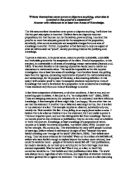If facts themselves never prove or disprove anything, what else is involved in the proof of a statement?"
“If facts themselves never prove or disprove anything, what else is involved in the proof of a statement?”
Answer with reference to at least two Areas of Knowledge.
The title assumes facts themselves never prove or disprove anything. I will show that this two-part assumption is incorrect. I believe facts can disprove incorrect propositions, but that they can not, by themselves, prove anything. I contend that proof is no more than adequate grounds for the acceptance of the proposition; admittedly, what counts as adequate and acceptable changes from one area of knowledge to another. Further, my position is that facts add to only one aspect of what we will consider as “proof”, namely providing evidence for justifying ones knowledge.
To prove a statement, in its purest sense, means to provide unshakable, undeniable and irrefutable grounds for the acceptance of the claim. Proof of a proposition, to this standard, is unobtainable in all areas of knowledge except mathematics (Bostock et al, 1982). If we stick literally to this meaning of proof we would need to restrict our discussions to mathematics alone. This would be impossible as the title requires investigation into at least two areas of knowledge. I am therefore forced into pulling back from the rigorous, demanding requirements of proof in the mathematical sense, and instead adopt, for the purpose of this essay, a less exacting definition. In this essay I will consider proof to mean the accepted standards required by an Area of Knowledge that need to be attained for a proposition to be considered as knowledge. These standards vary from one Area of Knowledge to another.
A fact lives independent of observers, or of other conditions. A fact is true, and not something open to debate. A fact just is, it’s, “an indisputable truth” (Slick, 2006). These are sweeping statements, but necessary for us to understand how facts influence knowledge. A few examples of facts might help. I am hungry. No one other than me can test this statement. It is either true or false and assuming it is true, then it is a fact. A true statement is a fact. This example requires an observer, admittedly only one, namely me. Now consider this fact. A tree falling in an empty forest makes a noise. I believe this to be a fact as I believe it is a true statement, but I am unable to prove it. This is an important point, and one that distinguishes fact from knowledge. Facts do not require proof or even evidence or justification, they do not even need us to believe in them; they just are. Knowledge, at least knowledge of a propositional nature, requires us to satisfy the criteria of justified, true belief (Abel, 1976). Consider one further example. The world is flat. This was believed by many (all?) people hundreds of years ago. Sailors refused to sail beyond the sight of land “because they were fearful of sailing over the edge of the world" (Flat Earth, 2006). Their beliefs were strong. They had some evidence for this belief. Water on the surface of a ball falls off, sailors who were foolish enough to explore beyond the horizon never returned, how could the world be round – people at the bottom would fall off! Their justifications, by modern standards, do not hold up to scrutiny, but to them their logic must have seemed impeccable. Was the world flat? Was it true, or a fact, to them? My contention would be no. Their beliefs and their justifications were false. The world was always round, regardless of who thinks so, and regardless of whatever evidence has been gathered for or against the statement. The world is round is a fact (assuming we ignore semantic problems such as the world is approximately ellipsoidal with local variations --- mountains and oceans).







